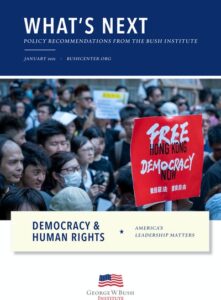Mature democracies must shun the temptation to glorify an individual political personality and make sure that the rule of law prevails over partisan interests, Pope Francis said on Monday. Without naming any country or specific incident in his speech to diplomats, he spoke of events in the past year “in countries with a long democratic tradition” that had shown the need for “inclusive, peaceful, constructive and respectful dialogue,” Reuters reports.
“The development of a democratic consciousness demands that emphasis on individual personalities be overcome and that respect for the rule of law prevail,” he said, without naming any individual politician. “Indeed, law is the indispensable prerequisite for the exercise of all power and must be guaranteed by the responsible governing bodies, regardless of dominant political interests.”
 The most novel aspect of President Joe Biden’s speech last week in which he committed the U.S. to “rebuilding the muscles of democratic alliances” was how he erased any clear distinction between foreign and domestic policy. The nation’s strength at home determines its success abroad—and vice versa, writes Council on Foreign Relations expert Stewart Patrick.
The most novel aspect of President Joe Biden’s speech last week in which he committed the U.S. to “rebuilding the muscles of democratic alliances” was how he erased any clear distinction between foreign and domestic policy. The nation’s strength at home determines its success abroad—and vice versa, writes Council on Foreign Relations expert Stewart Patrick.
But there were still two lingering questions, he writes for World Politics Review:
- First, are others are prepared to follow America’s lead, particularly in defending freedom, when its own democratic experiment is so tarnished?
- Second, can Biden reconcile his democracy promotion agenda with the need for practical cooperation with rivals in China and Russia on shared global challenges?
From my vantage point, there were three significant themes in President Biden’s speech, National Endowment for Democracy (NED) board member Eileen Donahoe (@EileenDonahoe), Executive Director of Stanford University’s Global Digital Policy Incubator (GDPI), writes for Just Security:
- First, President Biden sent a stark warning to our autocratic adversaries, most notably Russia and China, that they can expect the U.S. to confront them more directly and impose consequences for activities that undermine U.S. interests, particularly “grey zone” type activities that have escaped penalties in the past.
- Second, he made the point that diplomacy is a primary vehicle for advancing U.S. interest and that his administration will invest significant resources in the international diplomatic realm, especially to address transnational challenges like pandemics and climate change.
- Third, the president closed the speech with a subtle theme about the importance of American leadership on the world stage, not just to advance U.S. interests but to advance the interests of the democratic world. In effect, the president signaled that he will not retreat from the belief that the exercise of U.S. leadership contributes to global progress and good in the world.

Eileen Donahoe
Biden has consistently trumpeted the importance of democratic values as a key aspect of America’s identity and ethos, observers suggest. In a meaningful reference to his predecessor’s refusal to accept defeat and to the recent riots at the Capitol, he said this “fight” to uphold democracy would underpin the US’s future role in the world.
But America’s ability to be an effective advocate for democracy is much diminished in the aftermath of the January 6 insurrection at the US Capitol, and in view of the country’s polarized politics, endemic racism, and a year of Trump’s inept handling of the COVID-19 pandemic, argues CFR President Richard Haass, the author of The World: A Brief Introduction.
Although Biden is correct to criticize Russia and China for violating the rule of law, he cannot force their hand, he writes for Project Syndicate:
- Putin and Chinese President Xi Jinping are prepared to pay the price of sanctions to maintain political control, and the US cannot hold the entire relationship with either country hostage to human rights. It must consider other vital interests, a reality underscored by the Biden administration’s decision to sign a five-year extension of the New START nuclear pact with Russia.
- Similar realities (the need for help vis-à-vis North Korea just to mention one) will limit how much pressure the US can exert on China over its behavior in Hong Kong or toward its Uighur minority in Xinjiang. And even where Biden can place the rule of law at the center of US policy – say, in Myanmar – he may discover that governments can resist, especially if they have outside help.
All this raises questions about the wisdom of making democracy promotion so central to US foreign policy, Haass contends.
Whither US Foreign Policy? by Richard Haass @ProSyn https://t.co/b04CmD9nFr
— Democracy Digest (@demdigest) February 8, 2021







